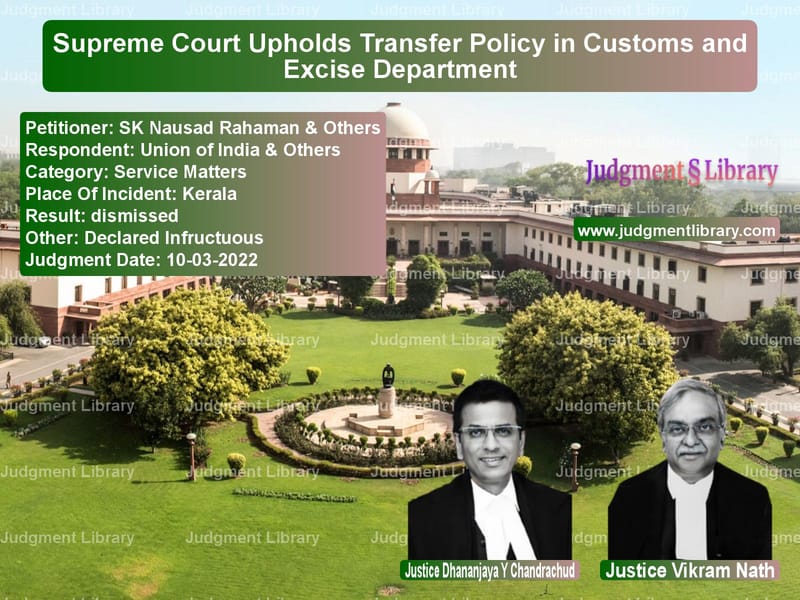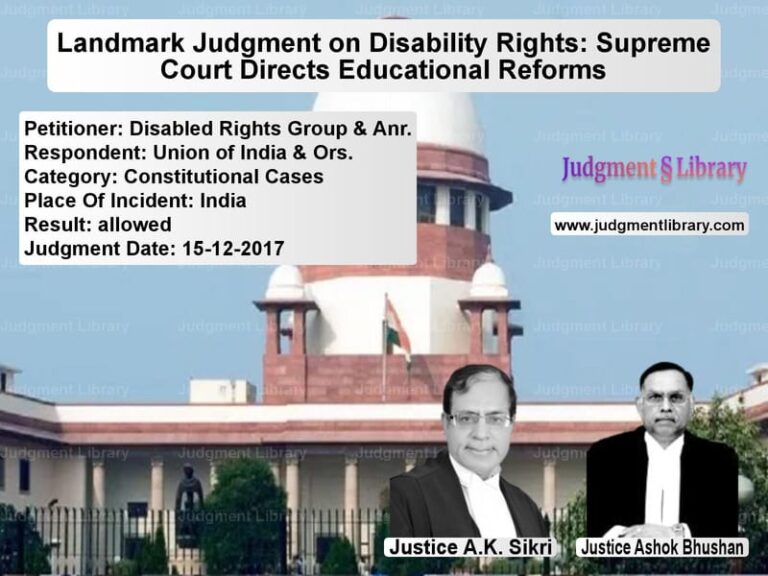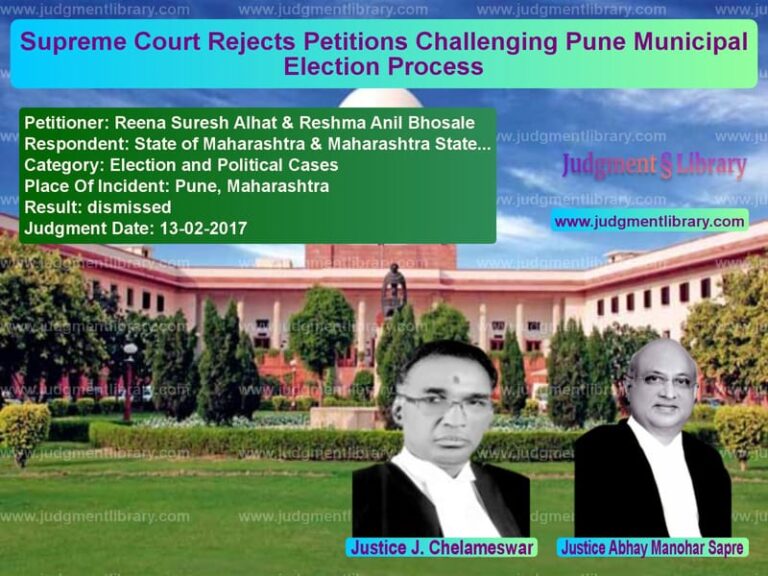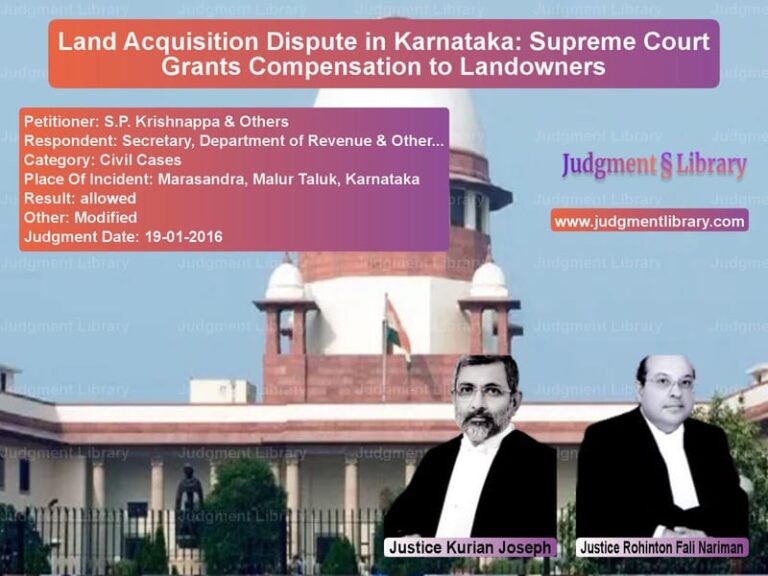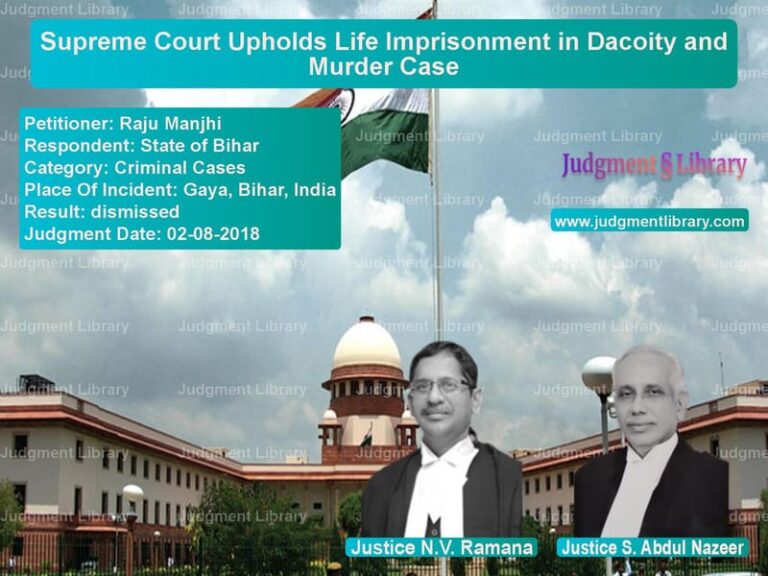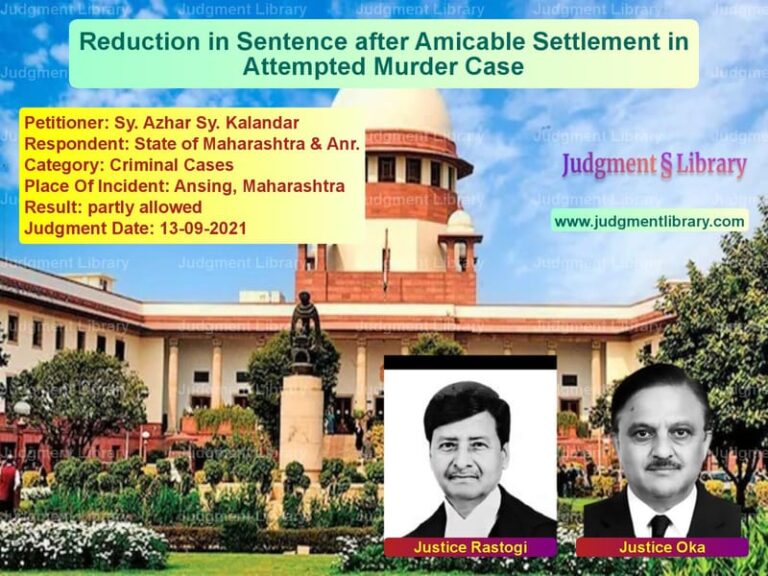Supreme Court Upholds Transfer Policy in Customs and Excise Department
The case of SK Nausad Rahaman & Others vs. Union of India & Others revolves around the policy regarding Inter-Commissionerate Transfers (ICTs) in the Customs and Excise Department. The Supreme Court ruled that ICTs are not a right of employees and must conform to the applicable service rules.
This appeal arose from a decision of the Kerala High Court, which upheld the government’s circular restricting ICTs under the Central Excise and Customs Commissionerate Inspector Group ‘B’ Posts Recruitment Rules, 2016 (RR 2016). The Supreme Court confirmed this decision.
Background of the Case
The appellants were Inspectors of the Central Excise and Land Customs Department, later assigned to the Goods and Services Tax Administration. They were initially recruited under the Recruitment Rules, 2002 (RR 2002), which allowed for ICTs under Rule 4(ii).
However, when RR 2016 replaced RR 2002, it removed this provision and specified that each Cadre Controlling Authority (CCA) would have its own separate cadre unless directed otherwise by the Central Board of Indirect Taxes and Customs (CBIC). Consequently, on September 20, 2018, CBIC issued a circular stating that ICTs were no longer permissible under RR 2016.
Legal Issues in the Case
- Whether RR 2016 precludes ICTs.
- Whether the circular dated September 20, 2018, is valid.
- Whether the absence of an ICT provision in RR 2016 constitutes a violation of employees’ rights.
- Whether ICTs can be justified based on executive instructions.
Arguments by the Petitioners (SK Nausad Rahaman & Others)
The appellants contended:
- ICTs were previously allowed under RR 2002 and should continue as a policy practice.
- The DoPT (Department of Personnel and Training) circulars on spousal posting and compassionate transfers should be applicable.
- The RR 2016 do not explicitly prohibit ICTs, meaning they should still be allowed under executive instructions.
- The ban on ICTs violates Articles 14 and 16 of the Constitution by treating Group B, C, and D employees differently.
Arguments by the Respondents (Union of India & CBIC)
The respondents argued:
- ICTs were explicitly removed in RR 2016, and no vested right to transfer exists.
- Each CCA must maintain its own cadre, making ICTs administratively impractical.
- Government circulars cannot override statutory rules made under Article 309 of the Constitution.
- DoPT’s executive instructions do not apply since RR 2016 are self-contained.
Supreme Court’s Observations
The Supreme Court analyzed whether the withdrawal of ICTs violated constitutional or administrative principles and made the following key observations:
- Under service law principles, transfer is an administrative decision and cannot be claimed as a right.
- RR 2016, framed under Article 309 of the Constitution, takes precedence over executive instructions.
- The power to allow ICTs was removed when RR 2016 replaced RR 2002.
- CBIC retains discretion to allow temporary transfers on extreme compassionate grounds.
- DoPT guidelines promoting spousal postings cannot override specific recruitment rules.
Based on these findings, the Supreme Court ruled:
- The appeal was dismissed.
- The September 20, 2018 circular was upheld.
- ICTs are no longer valid under RR 2016.
- Transfers on compassionate grounds can be considered only on a loan basis for a maximum of three years.
Legal Precedents Considered
The Supreme Court referred to multiple judgments on service matters:
- Union of India vs. SL Abbas (1993): Established that transfer is an administrative decision.
- Bank of India vs. Jagjit Singh Mehta (1992): Held that spousal postings are discretionary.
- State of MP vs. SC Hiranandani (2005): Ruled that cadre management must follow statutory rules.
Impact of the Judgment
This ruling has significant implications for government employees:
- ICTs are no longer a right and must align with RR 2016.
- Employees seeking transfers must apply under compassionate or temporary provisions.
- Administrative convenience takes precedence over employee preferences.
- The ruling reinforces that recruitment rules cannot be overridden by executive instructions.
By upholding CBIC’s circular, the Supreme Court reaffirmed that transfer policies are within the government’s prerogative and must align with statutory rules.
Petitioner Name: SK Nausad Rahaman & Others.Respondent Name: Union of India & Others.Judgment By: Justice Dhananjaya Y Chandrachud, Justice Vikram Nath.Place Of Incident: Kerala.Judgment Date: 10-03-2022.
Don’t miss out on the full details! Download the complete judgment in PDF format below and gain valuable insights instantly!
Download Judgment: sk-nausad-rahaman-&-vs-union-of-india-&-oth-supreme-court-of-india-judgment-dated-10-03-2022.pdf
Directly Download Judgment: Directly download this Judgment
See all petitions in Transfers Cases
See all petitions in Recruitment Policies
See all petitions in Judgment by Dhananjaya Y Chandrachud
See all petitions in Judgment by Vikram Nath
See all petitions in dismissed
See all petitions in Declared Infructuous
See all petitions in supreme court of India judgments March 2022
See all petitions in 2022 judgments
See all posts in Service Matters Category
See all allowed petitions in Service Matters Category
See all Dismissed petitions in Service Matters Category
See all partially allowed petitions in Service Matters Category

